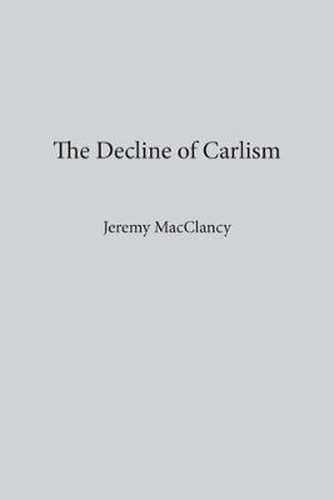Readings Newsletter
Become a Readings Member to make your shopping experience even easier.
Sign in or sign up for free!
You’re not far away from qualifying for FREE standard shipping within Australia
You’ve qualified for FREE standard shipping within Australia
The cart is loading…






The cause of three civil wars and almost endless civil strife, Carlism is one of the most significant forces in Spanish politics since the early-19th century, yet its remarkable evolution since the 1930s has gone undocumented. This study fills that gap, showing how the movement - a curious blend of populism and legitimism - shifted in the 1950s and 1960s from the extreme right to the moderate left, with its regal leaders declaring the need to establish a
socialist monarchy . By the early 1970s it had become an integral part of the avant-garde opposition to Franco, only to decline rapidly during the transition to democracy. Yet, as Jeremy MacClancy demonstrates, Carlism still manages to survive today, as both the Carlist political party and a living memory for today’s Basques. An innovative mix of anthropology and history, this book is the first-ever study of Carlism to set the movement in both its national and local contexts, considering both the machinations of its urban elites and the attitudes of the rural supporters. Writing in a highly readable manner, MacClancy reveals the key roles of discourse, symbols and rituals within the life of Carlism and how they were used by different factions as the party shifted across the political spectrum. He also draws out the significant legacies of Carlism to contemporary Basque nationalism. Based on more than a decade’s fieldwork in Navarra and research in a host of hitherto-unused archives, this work contributes to the understanding of both the modern Basque Country and modern Spain.
$9.00 standard shipping within Australia
FREE standard shipping within Australia for orders over $100.00
Express & International shipping calculated at checkout
The cause of three civil wars and almost endless civil strife, Carlism is one of the most significant forces in Spanish politics since the early-19th century, yet its remarkable evolution since the 1930s has gone undocumented. This study fills that gap, showing how the movement - a curious blend of populism and legitimism - shifted in the 1950s and 1960s from the extreme right to the moderate left, with its regal leaders declaring the need to establish a
socialist monarchy . By the early 1970s it had become an integral part of the avant-garde opposition to Franco, only to decline rapidly during the transition to democracy. Yet, as Jeremy MacClancy demonstrates, Carlism still manages to survive today, as both the Carlist political party and a living memory for today’s Basques. An innovative mix of anthropology and history, this book is the first-ever study of Carlism to set the movement in both its national and local contexts, considering both the machinations of its urban elites and the attitudes of the rural supporters. Writing in a highly readable manner, MacClancy reveals the key roles of discourse, symbols and rituals within the life of Carlism and how they were used by different factions as the party shifted across the political spectrum. He also draws out the significant legacies of Carlism to contemporary Basque nationalism. Based on more than a decade’s fieldwork in Navarra and research in a host of hitherto-unused archives, this work contributes to the understanding of both the modern Basque Country and modern Spain.